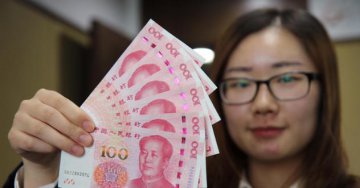
The U.S. is due to decide this week whether to designate China a currency manipulator. While it’s not expected to apply the label on this go around, the yuan has fallen more than 9% against the dollar since it last considered the move in April.
Tensions between the two nations have been building since then. It is tempting to think that China must be actively pushing its currency down in an attempt to offset the effect of the 10% tariffs being imposed on its exports to the U.S. by President Donald Trump. It is also tempting to want to punish China for what Vice President Mike Pence earlier this month called “currency manipulation” in a long list of Chinese policies in breach of “free and fair” trade. Both are mistaken.
Arguably the yuan should have weakened more. It is being pushed down by a slowing economy and easier monetary policy, at the same time that the dollar is being pushed up by the supercharged U.S. economy and higher interest rates. U.S. tariffs should lead to a weaker yuan and stronger dollar, too, even in a free market.
To simplify: “When bad things happen to a country, the currency goes down,” says Alan Ruskin, global co-head of FX research at Deutsche Bank.
The effects of the strong dollar are obvious everywhere, with major emerging market currencies –Mexico’s peso aside – all falling even more than the yuan against the greenback this year. The yuan is down a barely noticeable 2.3% against the currency of the next-largest economy, the euro. And adjusted for China’s higher consumer price inflation, it is down only 2.6% against its global trading partners, according to JPMorgan. The true issue this year is the strong dollar, not the weak yuan.
If anything, China has been preventing its currency from falling further. China’s central bank has recently pushed up the cost of borrowing for offshore speculators wanting to bet against the yuan, too, even as it loosened restrictions on bank lending domestically. And as Nicholas Lardy, senior fellow at the Peterson Institute for International Economics says, it has mostly been setting its daily fix – where trade starts each day – slightly stronger than the previous night’s close.
“The Chinese have been doing quite a bit to slow down the rate of depreciation,” Mr. Lardy said.
Why would China want to keep its currency stronger? In the long run because it has been trying to encourage more consumption, which is helped by having a stronger currency. Lots of exports are nice to have, but workers want cheap imports and foreign travel, too.
In the short run the incentive is to avoid panic. In 2015 China made a mistake by suddenly devaluing the currency, prompting speculators to pile in to bet against the yuan – and domestic companies to unwind the huge bets they had made on the yuan rising. The fall began to become self-fulfilling, and China burned through half a trillion dollars of reserves trying to halt the drop before tighter capital controls finally led to a rebound.
The lesson for China was to avoid drama in the exchange rate, keeping the decline in check and restricting outflows of money. So far it has worked, with currency reserves down only $74 billion, or 2%, from January’s peak.
This is manipulation, but not the sort that the U.S. worries about. Worse, if China did as the U.S. wants and decided to intervene to push the yuan up, it would have perverse and unwelcome effects on the U.S. bond market.
To understand this, consider how China used to hold its currency down by building up foreign exchange reserves – something that was obviously manipulation. When dollars flowed into the country, either from investment or from its trade surplus, the central bank recycled them back into U.S. Treasurys rather than let the yuan rise. This made China’s exports more competitive until its wages rose, and, according to former Federal Reserve Chairman Ben Bernanke’s “global savings glut” thesis, held down U.S. interest rates.
If China were to intervene to strengthen its currency now, it would mean selling U.S. Treasurys, or at least not rolling over maturing holdings, and selling the dollars for yuan. With markets already on high alert over rising bond yields, adding to the selling pressure on Treasurys wouldn’t be welcome.
Finally, the entire U.S. approach is odd. The Treasury’s tests label countries as currency manipulators only if they are deliberately weakening their currencies, not if they are deliberately strengthening them. If we cared about free markets, as Mr. Pence claimed, both should be seen as equally bad.
Mr. Pence is right that there is no proper free market in the yuan. But if there was, it would most likely be falling even faster than it has been.
Source: CNBC




















Latest comments